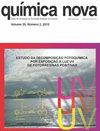FUNCTIONAL AND TECHNOLOGICAL PROPERTIES OF COFFEE MUCILAGE (Coffea arabica) AND ITS APPLICATION IN EDIBLE FILMS
IF 0.7
4区 化学
Q4 CHEMISTRY, MULTIDISCIPLINARY
引用次数: 0
Abstract
Brazil is the largest coffee producer in the world, and together with the millions of tons produced, millions of tons of residues are also generated. The generated residues are a source of environmental contamination depending on the chosen processing route. One of the main applications of food industry waste is in the production of raw materials to produce edible films and coatings. Coffee mucilage is a pectin-rich liquid residue from the coffee sector that can be used in the production of value-added products. Given this, the objective of this work was to characterize and evaluate the potential of functional and technological properties of coffee mucilage and your applicability in the production of edible films. The filmogenic mixture was obtained by casting from 10% (w/v) lyophilized coffee mucilage and solvent (water). The films produced from the coffee mucilage presented good homogeneity, continuity (absence of ruptures or fragile regions), flexibility, ease of detachment of the support and handling, without the need to add adjuvant to its formation. In addition, they presented uniformity in thickness, high light barrier and medium water vapor barrier. Thus, it can be concluded that mucilage is a potential product to be used in the cosmetic, pharmaceutical and food industries.咖啡胶浆(阿拉比卡咖啡)的功能、工艺特性及其在食用薄膜中的应用
巴西是世界上最大的咖啡生产国,在生产数百万吨咖啡的同时,也产生了数百万吨的残留物。根据所选择的加工路线,所产生的残留物是环境污染源。食品工业废弃物的主要应用之一是生产可食用薄膜和涂料的原料。咖啡胶是一种富含果胶的液体残渣,来自咖啡行业,可用于生产增值产品。鉴于此,本工作的目的是表征和评估咖啡粘液的功能和技术特性的潜力,以及它们在可食用薄膜生产中的适用性。以10% (w/v)的冻干咖啡胶浆和溶剂(水)为原料,通过浇铸得到成膜混合物。由咖啡粘液制成的薄膜具有良好的均匀性、连续性(没有破裂或脆弱区域)、柔韧性、易于脱离支撑和处理,而不需要添加佐剂来形成。此外,它们还具有厚度均匀性、高光阻隔性和中等水汽阻隔性。因此,可以得出结论,粘液是一种潜在的产品,可用于化妆品,制药和食品工业。
本文章由计算机程序翻译,如有差异,请以英文原文为准。
求助全文
约1分钟内获得全文
求助全文
来源期刊

Quimica Nova
化学-化学综合
CiteScore
1.60
自引率
12.50%
发文量
72
审稿时长
2-4 weeks
期刊介绍:
Química Nova publishes in portuguese, spanish and english, original research articles, revisions, technical notes and articles about education in chemistry. All the manuscripts submitted to QN are evaluated by, at least, two reviewers (from Brazil and abroad) of recognized expertise in the field of chemistry involved in the manuscript. The Editorial Council can be eventually asked to review manuscripts. Editors are responsible for the final edition of QN.
 求助内容:
求助内容: 应助结果提醒方式:
应助结果提醒方式:


